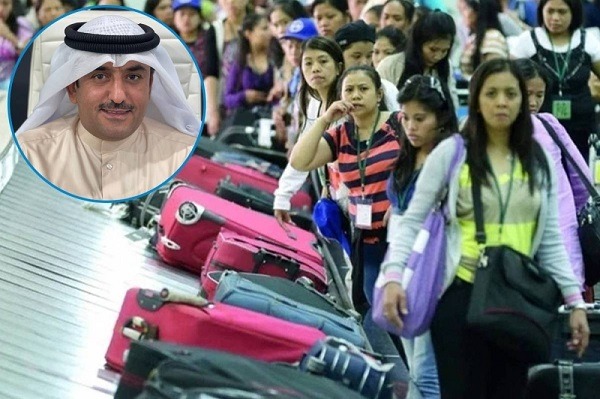The Undersecretary of the Philippine Ministry of Foreign Affairs, Eduardo de Vega, said “Manila hopes to sit with the government of Kuwait and discuss the possible resumption of sending Filipino workers again to Kuwait.
He made the statement after the juvenile court in Kuwait convicted the killer of Filipino domestic worker,” reports Al-Jarida daily.
The specialist in domestic workers’ affairs, Bassam Al-Shimmari, revealed the Philippine Association of Recruitment Agency Secretaries in Kuwait recently called on some owners of local recruitment offices to hold an urgent virtual meeting for a dialogue via the Zoom platform at 3:00 pm on Oct 12 to discuss the possibility of Manila resuming the sending of new domestic workers.
This happens in light of the two recent moratorium decisions issued by the two countries.
Al-Shimmari told Al-Jarida, “The invitation addressed to us from the Philippine side came based on a request submitted by the association to President Ferdinand Marcos, Jr., to resume joint dialogue between officials of the two countries, so that a consensus could be reached that would end the existing dispute and lift the ban imposed on Filipino workers.”
He stressed that this step is a new “positive initiative” that reflects the intentions of the Philippine side to end the dispute and resume labor relations that were severed approximately 8 months ago, calling on the government, represented by the relevant authorities, led by the Ministries of Foreign Affairs and Interior, to exploit this initiative from the Philippine side and build on it.
This is in the interest of the peoples of both countries, in light of the market currently suffering from a severe shortage of domestic workers since the decision to stop issuing new worker visas to Filipino workers.
Al-Shammari expected that the meeting would discuss solutions to the outstanding issues, most notably the problem of overcrowding of female workers in a building belonging to the embassy, in addition to quickly resolving labor disputes and restoring financial rights to their owners, related to employers’ refusal to pay monthly salaries or end-of-service benefits, or related to withholding female workers’ documents whether the civil ID or passport, in addition to emphasizing the role assigned to the Labor Shelter Center affiliated to the PAM to quickly containing disputes that may break out between female workers and their employers.
He added: “Filipino domestic workers in the Kuwaiti market are estimated at about 200,000 workers, with a percentage that constitutes 50 percent of the total domestic workers in the country of various nationalities, which confirms the importance of this worker to most Kuwaiti and expatriate families who prefer to use their services for several reasons, most notably the ease of communication, good educational level, and knowledge of community customs and traditions.”
In parallel with the Philippine position, concerned local sources revealed that Kuwaiti objections to “some malpractices of the Philippine Embassy” still exist, including the embassy’s continued supervision of “shelters” affiliated with it that include workers who violate the residency law or against whom absconding reports have been issued which Kuwait considers “a violation of the laws, decisions and regulations in force within the country, and a violation of recognized diplomatic norms.”
The sources confirmed that the country’s position regarding any Philippine proposal will be based on the “constants” announced by the Kuwaiti side in its previous negotiations, which are “ending violations of the law, providing an official pledge from the Philippine embassy not to repeat them, and informing the Manila government of this recognition and publishing it in the official media.”
He stated that any approach to resolving the crisis lies in the Philippines’ commitment to the above, noting that Kuwait is seeking to secure labor alternatives from other countries, to replace the currently existing Filipino workers if they decide to leave permanently.

